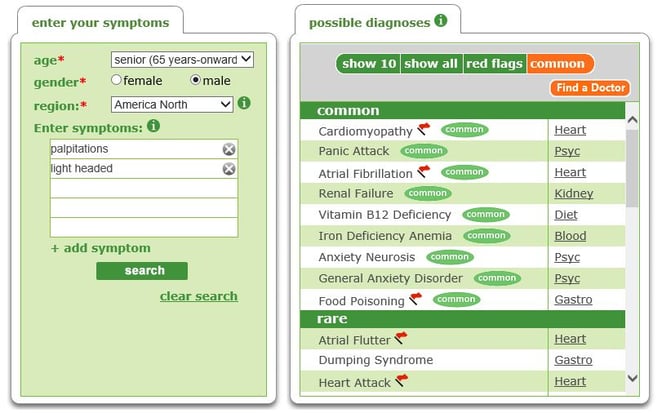- Privacy Policy
- Terms & Conditions
- Contact us
- ©Isabel Healthcare 2020
Could I have Atrial Fibrillation? Symptoms and Causes
 February brings us Valentine’s Day, a day where we celebrate all matters of the heart. Both the UK and USA have embraced this concept, and seen it as an opportunity to raise awareness of heart health, so February also marks National Heart Month for both countries. We have chosen to write about one of the most common forms of abnormal heart rhythm conditions, Atrial Fibrillation (AF). It affects around six million people in the US and over one million people in the UK. Because of this, it’s really important that you know the symptoms to look out for and how you can manage the condition should you have it.
February brings us Valentine’s Day, a day where we celebrate all matters of the heart. Both the UK and USA have embraced this concept, and seen it as an opportunity to raise awareness of heart health, so February also marks National Heart Month for both countries. We have chosen to write about one of the most common forms of abnormal heart rhythm conditions, Atrial Fibrillation (AF). It affects around six million people in the US and over one million people in the UK. Because of this, it’s really important that you know the symptoms to look out for and how you can manage the condition should you have it.
What is Atrial Fibrillation?
AF is a heart condition that causes an irregular and often abnormally fast heart beat. Normally, your heart sends out regular electrical impulses which help control the flow of blood and therefore oxygen around the body. AF happens when these impulses fire off from different places in the atria - the upper chambers of the heart - in a disorganised, or ‘fibrillated’ way. While the condition isn’t considered life-threatening, if left untreated, people with AF are five to seven times more likely to form blood clots and as a consequence, the chances of you suffering a stroke are increased by 4 or 5. In extreme cases, if left untreated, persistent AF may start to weaken your heart and ultimately lead to heart failure. Think of AF as a friendly warning sign to improve your health before more serious heart conditions become a concern.
Atrial Fibrillation (AF) Symptoms
There are several common symptoms those with AF may experience:
- Palpitations (when you are aware of your heart beat)
- Excessive tiredness
- Dizziness or feeling faint
- Shortness of breath
- Chest discomfort or pain
When the symptoms of AF are placed into the Isabel Symptom Checker, it comes up with the following suggestions:

Some people, however, have no symptoms at all, as the fibrillations are too subtle to be able to feel. In these cases, the majority are only diagnosed by chance when visiting the doctor for another reason. Even without symptoms, AF is a serious medical condition, so regular checkups, especially for those over 65 who are more at risk, are crucial to ensure conditions like this are picked up early.
Atrial Fibrillation (AF) Causes
AF is caused by an abnormal or damaged heart structure, and this can happen for several reasons. Those between the ages of 65 and 85 tend to have a higher risk of AF, with more men affected than women, although conversely women with AF are at greater risk of suffering a stroke than men. Other lifestyle choices can affect your chances of suffering from AF, such as excessive alcohol, taking illegal ‘upper’ drugs, or even just an excessive caffeine intake. If someone already suffers from AF, these same occurrences can also trigger an attack of AF.
Those with AF are more at risk from similar heart and respiratory conditions. These include but are not limited to:
- Hypertension (high blood pressure)
- Coronary heart disease
- Hyperthyroidism (overactive thyroid gland)
- Excessive alcohol consumption
- Diabetes
- Lung disease
- Kidney disease
- Sleep apnea
- If you have a history of AF in the family
However, it can sometimes affect people who are otherwise physically very fit and healthy. Some patients might have a normal, regular resting heart rate but experience AF symptoms when taking intense exercise.
How is Atrial Fibrillation (AF) diagnosed?
The diagnosis of AF is relatively simple in most cases. Simply feeling your own pulse can often detect it, and it can then be confirmed by a doctor. Here’s a video from the British Heart Foundation explaining the best way to feel your pulse on your wrist. When checking for AF, you need to note if your heart is beating at a regular pace, and at the right speed. If the pulse beat is irregular and variable in strength, then AF is a likely cause. The pace should be between 60-100 beats per minute, and anything considerably higher than 100 bpm could be AF, and will probably also be causing dizziness or shortness of breath.
If you think your heart beat might be irregular or too fast, you should see your Doctor as soon as possible, and let them know that you checked your own pulse, as well as discussing the results your symptoms brought up on Isabel. In some cases, you may then undergo diagnostic testing such as an ECG (Electrocardiogram) to check your heart’s electrical activity and undergo further tests to look for underlying conditions that are causing these symptoms.
If you’re unable to get an early appointment with your Doctor and are worried about your symptoms, or are finding that symptoms such as palpitations or breathlessness only occur when taking intense exercise, we highly recommend the Kardia Mobile. This allows you to record a medical-grade ECG in just 30 seconds in the comfort of your home. The device is clinically validated and FDA approved, and allows you to track your heart rhythms by placing your finger pads on a special attachment plate which, after 30 seconds sends a reading to your phone which you can then share with your doctor along with the suggestions from the Isabel Symptom Checker.
How do you treat AF?
Treatments for AF include medications to control heart rate and reduce the risk of stroke, and procedures such as cardioversion to restore normal heart rhythm. Some patients respond quickly to treatment from their family doctor while others may be referred to a cardiologist for further investigations and treatment. The overall aim of any treatment is to reduce the resting heart rate to under 100 beats per minute and to restore normal regular heart rhythm. Once treated, patients are advised to maintain a heart-healthy diet and lifestyle with regular exercise.
If you are concerned about your symptoms for atrial fibrilliation or any other illness, why not put them into the Isabel Symptom Checker? You can then discuss your findings with your doctor. The tool is completely free and based on the professional tool used by doctors:
Subscribe Here!
Recent Posts
Virtual Triage: Do more questions lead to better patient outcomes?
One of the common misconceptions related to virtual triage / symptom checker tools is that the more..Webinar: Using Virtual Triage To Transform Patient Access
Outdated contact centers are posing problems for today's health systems. As longer hold times..List Of Categories
- Differential Diagnosis Decision Support
- Differential diagnosis
- Symptom Checker
- Symptoms
- Medical Error
- Patient Disease Information
- Disease
- Diagnostic Decision Support
- Clinical Decision Support
- Isabel 1 Minute Read
- Diagnosis Error
- Diagnosis Skills Cases
- Healthcare Informatics
- Medical Education
- Patient Engagement
- Clinical Reasoning
- Evidence-based Medicine
- Symptom Triage
- Nurse Practitioner Education
- Nursing Decision Support
- Partnership
- Public Health
- COVID-19
- EHR
- Patient Empowerment
- Patient Safety
- rare disease

Start your FREE Trial today
Try the Isabel Pro DDx generator for 30-days - no payment card details required.




